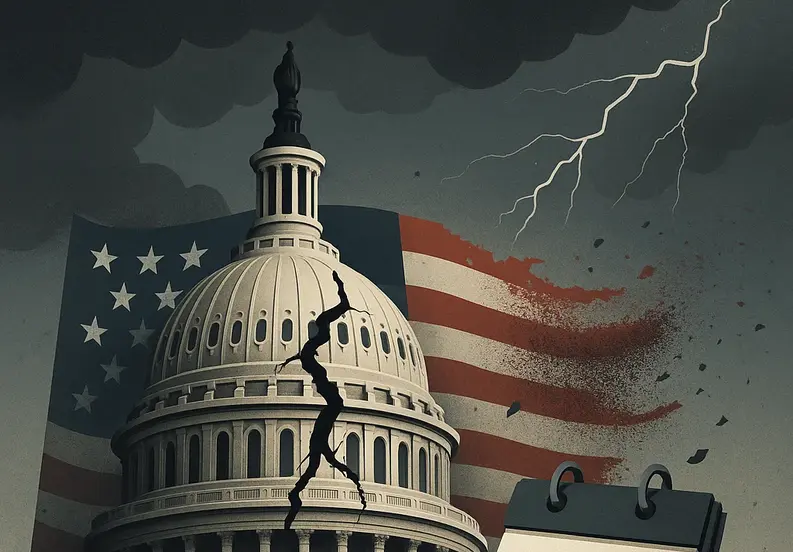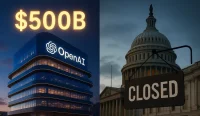Top 10 reasons the American Empire may end by 2026 as the United States faces unprecedented challenges including economic inequality, political polarization, military overextension, and declining global influence. This analysis creates numerous job opportunities in policy analysis, social reform, economic research, and international relations.
In the last 10 years, more than half of the new wealth created globally has gone to the richest 1% of humanity, highlighting the growing economic inequality that threatens American stability. The analysis reveals critical challenges that could fundamentally alter America’s position as the world’s leading superpower, creating diverse career opportunities for professionals who can address these systemic issues.
The American Empire decline analysis affects multiple stakeholders: policy analysts and government advisors, social reform advocates and community organizers, economic researchers and inequality analysts, international relations and diplomacy specialists, cybersecurity and infrastructure protection professionals, education reform and workforce development specialists, healthcare policy and public health advocates, and political strategists and democratic reform specialists.
For job seekers, understanding these systemic challenges is crucial for identifying opportunities in policy analysis, social reform, and economic research. The focus on addressing inequality and political dysfunction creates demand for professionals who can develop solutions to complex societal problems.
Military Overextension and Resource Depletion
American military spending reached $916 billion in 2023, more than a third of the globe’s total, yet the country’s role as the world’s protector has left it spread too thin and sputtering.
The strain became particularly evident during the tail end of Joe Biden’s presidency amidst Russia’s invasion of Ukraine, the war in Gaza, and ongoing economic conflict with China. America faces a real risk of a geopolitical run on the bank because it has made commitments well beyond its military’s ability to follow through, creating more fighting rather than making the world safer.
The second administration of President Donald Trump has aggressively tried to overcorrect this by pulling back on foreign aid programs, but these efforts have been met with widespread backlash and resistance. With fewer active Navy vessels than ever, America may have reached a point where it’s too little too late to maintain its global military dominance.
This military overextension creates opportunities for professionals in international relations, defense policy analysis, and diplomatic solutions that can help America transition from a military-first approach to more sustainable forms of global engagement.
Cybersecurity Vulnerabilities and Infrastructure Threats
Top 10 reasons the American Empire may end by 2026 includes growing concerns about sophisticated cyber attacks on critical infrastructure. US Senate Intelligence Committee Chair Mark Warner has called it the worst telecom hack in the nation’s history, with Chinese hacking operations targeting essential systems.
According to a 2025 FBI report, last year saw a new record for losses totaling a staggering $16.6 billion, with successful ransomware attacks increasing by 33% in 2024. Critical infrastructure including agriculture, telecommunications, water supply, electrical grids, oil and natural gas pipelines, and transportation systems face increasing pressure from cyber threats.
The persistent cyber espionage threat Volt Typhoon, rumored to be an agent of the Chinese government, specifically targets US critical infrastructure to deter American involvement in Taiwan-related issues. This represents a fundamental threat to national security that requires immediate attention and professional expertise.
The cybersecurity crisis creates enormous opportunities for professionals in cybersecurity analysis, infrastructure protection, threat assessment, and digital defense systems that can help secure America’s critical infrastructure against foreign adversaries.
Breakdown of International Alliances and Treaties
President Trump’s aggressive trade policies have strained relationships with traditional allies like Canada and Mexico.
Trump’s inexplicable trade war with Canada and Mexico, his NAFTA partners, includes suggestions that Canada should become the 51st state and referring to former Prime Minister Justin Trudeau as “Governor Trudeau.” He has also declared that the US should take ownership of Greenland, historically an autonomous territory of Denmark.
These actions represent a fundamental breakdown in diplomatic relationships that have supported American global leadership for decades. The erosion of these alliances undermines America’s ability to maintain its position as the world’s leading superpower and creates opportunities for diplomatic professionals who can rebuild these relationships.
The breakdown of international alliances creates opportunities for professionals in international relations, diplomatic services, trade policy analysis, and foreign affairs who can help restore America’s standing in the global community.
Healthcare System Collapse and Public Health Crisis
The US ranks last in overall health system performance among 11 high-income countries according to the Commonwealth Fund’s Mirror Mirror report.
President Trump has endorsed a House budget plan that would make sweeping cuts to Medicaid, with roughly $880 billion cut from Medicaid and $230 billion cut from the Supplemental Nutrition Assistance Program. The US remains the only developed country that doesn’t guarantee healthcare as a right to its citizens.
The December 2024 murder of United Healthcare CEO Brian Thompson was seen as another sign that the current healthcare system is unsustainable. This represents a fundamental failure of the American healthcare system that affects millions of citizens and creates opportunities for healthcare policy professionals.
The healthcare crisis creates opportunities for professionals in healthcare policy analysis, public health advocacy, medical system reform, and healthcare administration who can help develop solutions to America’s healthcare challenges.
Healthcare at a Crossroads
America’s healthcare crisis is exposing deep system failures — but it also creates opportunities for change. Employers can lead the way by hiring professionals in healthcare policy, public health, and medical administration to build solutions that work. Post your job on WhatJobs today and connect with candidates ready to tackle one of the nation’s greatest challenges.
Post a Job Free for 30 Days →Education System Decline and Knowledge Crisis
American students’ poor test scores are raising questions about the importance of history and civics education, with only 13% of eighth graders considered proficient in US history.
The COVID-19 pandemic had devastating consequences for American students, but it may have only accelerated trends that were already developing. Students in the bottom quartile have been losing ground on the National Assessment of Educational Progress since around 2013, with American fourth graders dropping 18 points in math and eighth graders dropping 27 points between 2019 and 2023.
American school children have lost significant ground in math and reading to countries like Poland and Australia, which used to noticeably lag the US in international rankings. Students of color, those who are economically disadvantaged, and students with learning disabilities saw their scores sink the lowest.
The education crisis creates opportunities for professionals in education reform, curriculum development, educational policy analysis, and workforce development who can help restore America’s educational competitiveness.
Public Debt and Fiscal Crisis
The national debt has now surpassed $35 trillion, equating to over $104,000 per person, and is mounting quicker than most economists had predicted.
The US national debt skyrocketed to $36 trillion at the end of 2024, compared to $19.5 trillion in 2016, due to heavy federal borrowing during the COVID pandemic and the respective agendas of Presidents Trump and Biden. President Trump has stoked mass distrust of various institutions and floated the assertion that the exact numbers of the national debt are fraudulent.
While Brookings cautioned that the chance of a severe and enduring fiscal crisis over the next few decades from debt accumulation appears quite low, Trump’s flip-flopping rhetoric on the economy could have disastrous consequences. The government’s spending problem represents a fundamental threat to America’s economic stability.
The fiscal crisis creates opportunities for professionals in economic policy analysis, budget management, fiscal reform, and economic research who can help address America’s debt and spending challenges.
Erosion of Democratic Norms and Institutions
Since President Trump retook office, his critics have accused him of democratic backsliding, consolidating unprecedented amounts of power in his own hands and those of his closest allies.
Trump’s signature use of executive orders to bypass the US House and Senate has been highly legally challenged, while giving billionaire entrepreneur Elon Musk the go-ahead to rip the federal budget to shreds with minimal oversight has raised alarm bells nationwide and worldwide.
The Trump administration’s moves to slash the federal workforce, with thousands of government employees bracing for layoffs, represents a fundamental attack on democratic institutions. This erosion of democratic norms threatens America’s ability to maintain its position as a global leader in democracy and human rights.
The democratic crisis creates opportunities for professionals in democratic reform, institutional strengthening, constitutional law, and political system analysis who can help restore America’s democratic foundations.
Declining Global Reserve Currency Status
The dollar has lost value against the euro, the yen, the pound, and a host of other currencies, making imports more expensive for Americans even before tariffs are applied.
The 10-year Treasury yield had the biggest weekly gain since 2001, reflecting concerns that the US is no longer the safe haven it has been for a very long time as the reserve currency of the world. China wants to use the renminbi as more of an invoicing currency, and some of its trade allies will continue to be pushed in that direction.
History tells us that regimes, kingdoms, and regions that had reserve currency status suffered immense economic hardship after they lost it. The Trump administration’s chaotic unpredictability, while claimed to restore American prosperity, hasn’t yet panned out that way and may be accelerating the dollar’s decline.
The currency crisis creates opportunities for professionals in international finance, monetary policy analysis, currency markets, and economic diplomacy who can help maintain America’s economic leadership.
Navigating the Currency Crisis
The dollar’s declining role as the world’s reserve currency signals new risks — and opportunities — in global finance. Employers can strengthen their organizations by hiring experts in international finance, currency markets, and economic policy. Post your job on WhatJobs today and connect with professionals ready to safeguard stability and drive global competitiveness.
Post a Job Free for 30 Days →Internal Political Polarization and Gridlock
The divide has strengthened across America, with many people unable to even agree to disagree, dividing friends, families, and making people be really ugly to each other.
Whereas previous generations of political leaders carried themselves with dignity and respect for their office, partisan politics has turned into a mudslinging wrestling match. Positive views of the government held by the public are at an all-time low, and people are becoming increasingly frustrated that nothing ever seems to get better.
As Americans get more polarized, so do elected officials, taking more extreme stances to the left or right than ever before. This simply results in more disagreement and headbutting, creating a cycle that continues anew and prevents effective problem-solving.
The polarization crisis creates opportunities for professionals in political mediation, conflict resolution, civic engagement, and democratic dialogue who can help bridge America’s political divides.
Economic Inequality and Social Unrest
Elon Musk, Jeff Bezos, and the world’s richest men got $465 billion richer in the last four years, according to Oxfam, amounting to $14 million per hour, while nearly 5 billion people are poorer than they were four years ago.
Of all the reasons for the American Empire’s decline, it could be argued that pervasive income inequality underlines them all. While US citizens have long reported feeling disillusioned with the ever-growing gap between rich and poor, the frustration is seemingly coming to a head in 2025.
According to a Gallup survey, 40% of upper-income households say price increases are causing financial hardship, compared to 74% of low-income households. Polling from Pew Research reveals 66% of Americans who believe there is too much economic inequality think the federal government should step in to help.
The uneven distribution of wealth has left Americans feeling increasingly hopeless about their country’s future, with the average level of wealth in a black household at just over $200,000, while a white household averaged over $1.3 million. This represents a fundamental threat to America’s social stability and democratic ideals.
Frequently Asked Questions
What are the top 10 reasons the American Empire may end by 2026?
The top 10 reasons include military overextension, cybersecurity vulnerabilities, breakdown of international alliances, healthcare system collapse, education system decline, public debt crisis, erosion of democratic norms, declining reserve currency status, political polarization, and economic inequality.
How does economic inequality threaten the American Empire?
Economic inequality creates social unrest, political instability, and loss of faith in democratic institutions, as the richest 1% captures more than half of new global wealth while millions of Americans struggle with basic necessities.
What role does political polarization play in America’s decline?
Political polarization prevents effective governance, creates gridlock, and undermines democratic institutions, making it impossible to address the systemic challenges facing the nation
Are there opportunities created by these challenges?
Yes, these challenges create opportunities for professionals in policy analysis, social reform, economic research, international relations, cybersecurity, education reform, healthcare policy, and democratic strengthening.
A Real-World Example: Sarah’s American Dream Struggle
Sarah Johnson, a 35-year-old teacher from Detroit, Michigan, represents the millions of Americans whose lives are affected by the systemic challenges threatening the American Empire. With a salary of $45,000, student loan debt of $60,000, and two children, Sarah struggles to make ends meet despite working full-time.
“I used to believe in the American Dream,” Sarah explains. “But now I see how the system is rigged against people like me. The rich keep getting richer while my family struggles to afford basic healthcare and education for our kids.”
Sarah’s situation illustrates how economic inequality, healthcare costs, education challenges, and political dysfunction affect real families. She represents the growing number of Americans who feel disillusioned with their country’s direction and uncertain about their future.
“The scariest part is that I don’t see how things can get better,” Sarah says. “The politicians are too busy fighting each other to solve real problems, and the people in power seem more interested in helping the wealthy than helping working families like mine.”
Sarah’s story demonstrates that the decline of the American Empire isn’t just about abstract political and economic concepts – it’s about real people losing faith in their country’s ability to provide opportunity and justice for all citizens. Her experience reflects the growing sense of hopelessness that threatens America’s social fabric and democratic ideals.




